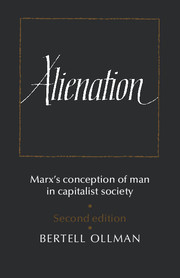Book contents
- Frontmatter
- Contents
- Preface to the second edition
- Note on translations
- Acknowledgements
- General introduction
- PART I PHILOSOPHICAL INTRODUCTION
- PART II MARX'S CONCEPTION OF HUMAN NATURE
- PART III THE THEORY OF ALIENATION
- PART IV CONCLUSION
- Appendix I In defense of the philosophy of internal relations
- Appendix II Response to my critics: more on internal relations
- Notes to the text
- Bibliography of works cited
- Index of names and ideas
- Cambridge Studies in the History and Theory of Politics
General introduction
Published online by Cambridge University Press: 05 June 2012
- Frontmatter
- Contents
- Preface to the second edition
- Note on translations
- Acknowledgements
- General introduction
- PART I PHILOSOPHICAL INTRODUCTION
- PART II MARX'S CONCEPTION OF HUMAN NATURE
- PART III THE THEORY OF ALIENATION
- PART IV CONCLUSION
- Appendix I In defense of the philosophy of internal relations
- Appendix II Response to my critics: more on internal relations
- Notes to the text
- Bibliography of works cited
- Index of names and ideas
- Cambridge Studies in the History and Theory of Politics
Summary
‘Marxism’ is essentially Marx's interpretation of capitalism, the unfinished results of his study into how our society works, how it developed, and where it is tending. Men in their relations with each other, their products and activities are the primary subject matter of this study. It is men who fight on both sides of the class struggle, men who sell their labor-power, men who buy it, and so on. Though Marx generally organizes his findings around such non-human factors as the mode of production, class and value, his theory of alienation places the acting and acted upon individual in the center of this account. In this theory, man himself is offered as the vantage point from which to view his own relations, actual and potential, to society and nature; his conditions become an extension of who he is and what he does, rather than the reverse. To expound the analysis of capitalism made from this vantage point, an analysis that remains little known despite the current preoccupation with the term ‘alienation’, is the task of this book.
Marx's individual, however, is himself a product of theory. Marx has a conception of how men appear, what they feel and think, what motives influence them and how much, and – on another plane – what they are capable of, both in existing and in new conditions. Without these qualities, they could not or would not respond to events in the manner Marx posits.
- Type
- Chapter
- Information
- AlienationMarx's Conception of Man in a Capitalist Society, pp. xi - xviiiPublisher: Cambridge University PressPrint publication year: 1977



